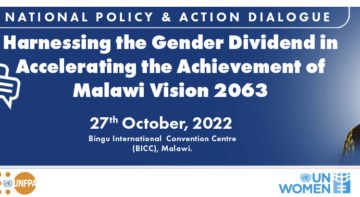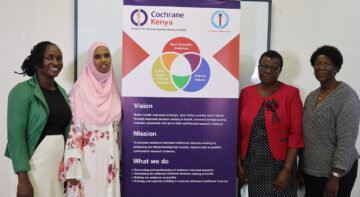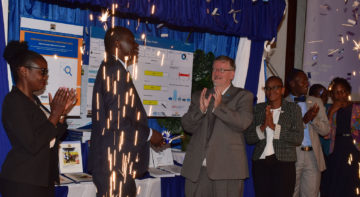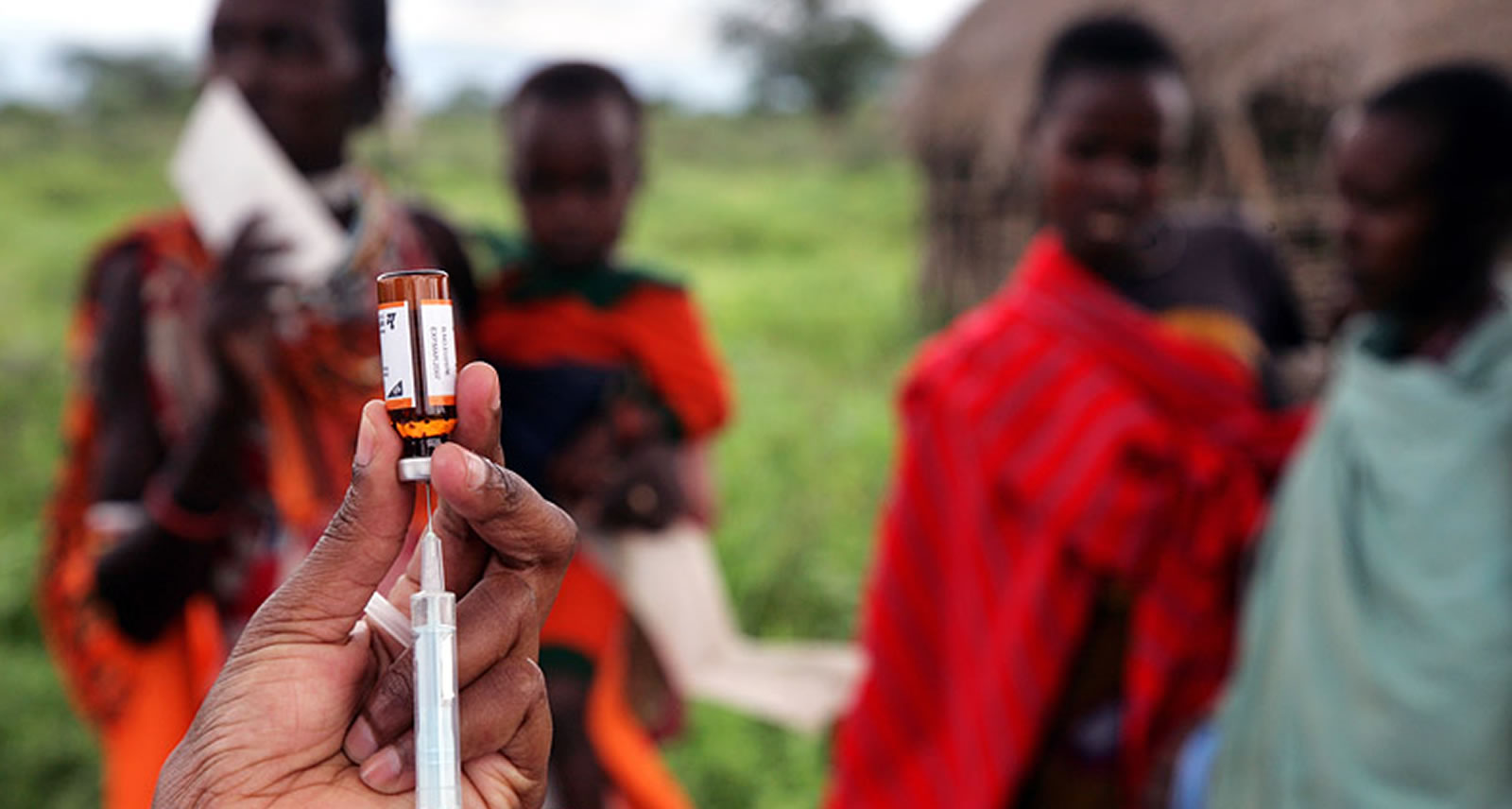Blogs

The use of research evidence in decision-making by policymakers in the health sector is critical for enabling the formulation and implementation of the most effective policies and programmes. Despite that reality, many scholars have documented that policymakers often do not sufficiently use research evidence to inform their decisions because of several common barriers (see Innvaer et al 2002; Oliver et al 2014). One of the well-documented barriers to research use is the lack of knowledge and skills in finding, appraising, interpreting and applying evidence as part of the policymaking process.
The DFID-funded Strengthening Capacity to Use Research Evidence in Health Policy (SECURE Health) programme being implemented in Kenya and Malawi has designed a training programme for policymakers in the health sector to strengthen their knowledge and skills in accessing, appraising, synthesising and applying research evidence in policymaking (i.e. the SECURE Health evidence-informed policymaking (EIPM) training programme).
The SECURE Health programme is implemented by a consortium of five institutions led by the African Institute for Development Policy (AFIDEP) in partnership with the ministries of health and parliaments in Kenya and Malawi. The training is not the only intervention, but is one of several designed to sustainably build real-world capacity for evidence-informed policymaking. Related activities include cultivating champions, ongoing mentoring, and facilitating increased interactions between research producers and end-users.
The SECURE Health EIPM training programme comprises two components, namely, a 5-day training workshop followed by a one-year follow-up support programme. In March and April 2015, the SECURE Health programme conducted four sets of training workshops in Kenya and Malawi.
Through these workshops, 76 policymakers comprising Ministry of Health (MoH) and parliament staff from the two countries were trained. From MoH, the staff trained included technical staff responsible for conceptualizing and drafting policy and programme documents or advice; these were mainly technical staff heading divisions and units as well as the programme managers and officers who work in these divisions and units. For parliament, the staff included parliamentary researchers, committee clerks, and library staff.
In this blog, we share some of the lessons, experiences and reflections from the delivery of the training workshops.
Competitive selection of policymakers to be trained did not work
In order to attract policymakers who are genuinely interested in the training programme we attempted to conduct a competitive application and selection process. There were some levels of resistance to or doubt about this approach in both countries, some of which turned out to be accurate.
In both countries, very few applications were received, and so we had to request senior officials in MoH and parliament to nominate more staff for training. We therefore blended the application and nomination approaches for the selection process. The fact that we had a clear eligibility criterion ensured that we got the right staff for training even through the nomination process.
The training workshops effectively increased the knowledge and skills of policymakers in finding, assessing, synthesizing and applying research evidence in their work.
A pre and post-training survey in both Kenya and Malawi was used to assess (immediate/short-term) effectiveness at improving participants’ knowledge, skills, and attitudes for accessing, appraising, synthesising and applying evidence. On a scale from 1 to 5, all objectives were rated as 3.85 and above in Kenya and above 4 in Malawi.
Differentiating a policy question from a research question
Differences between a policy versus a research question are critical yet are often blurred and confusing to decision-makers. Interestingly but not surprisingly, policymakers seem more familiar with defining conventional research questions (e.g., did this HIV prevention intervention work?) and less familiar with defining policy questions (e.g., what actions in my country will be the most effective for successfully preventing HIV at policy, programme, and service levels?)
In other words, the answers to multiple research questions will help you answer a policy question. Providing clear guidance to help policymakers in refining their initial questions into specific policy questions generated a lot of passionate discussion and debate during all four workshops.
How and where to find evidence
Where to find quality evidence for health sector decision-making on the Internet and tips in refining online/web-based searches to find only useful content attracted the most interest for our participants. Many policymakers did not know where to find useful and quality evidence on the Internet, including those available free of charge (open access).
They therefore reported finding the sub-sessions on identifying and searching these databases most useful, and here is where the most significant improvement was demonstrated during the post-training test. Commenting on this, a parliament staff from Malawi said: “Because of this training, I am now able to use other search engines apart from Google such as POPLINE, Google Scholar, and Research for Life”.
Assessing the quality of evidence
The session on appraising the quality of the evidence found through better searching was also reported as very useful. Many policymakers lacked a good understanding of basic study designs and methods and their subsequent implications for the strength and quality of research findings, and therefore found this session most informative.
Indeed, during each workshop we spent more time than anticipated in the curriculum agenda for this session. Pre- and post-training test results reveal this as the second place the second session where participants gained most skills.
Synthesising evidence for informing policy decisions
The session on synthesising evidence is essentially the core of the training programme as it involves reviewing appraised evidence, interpreting it to understand its implications for specific policy issues, and preparing coherent syntheses and policy briefs with recommendations.
The synthesis session took the most time (40% of the five-days). Policymakers indicated that although their day-to-day work already involves preparing policy or issue briefs, the training helped them to become more systematic and critical in this process. The development of policy briefs will make up an important part of our ongoing follow-up process, as we will continue supporting participants in completing and disseminating the policy briefs started at the workshops.
What worked well
The whole training programme was grounded on adult-learning principles to ensure a participatory and more enriching and effective learning process. A focus on drawing from participants’ knowledge and experience in the delivery of the training was especially enriching and made it easy for participants to relate to the training. On the other hand, this often produced lengthy discussions and contributed to challenges in time management. Well-trained and flexible trainers are critical to handle this format.
In general the interest and commitment of the policymakers involved in the training was outstanding. In a way this proved that the selection of training participants through senior officials was still an effective way of selecting appropriate and engaged government staff for future trainings.
Some challenges
Even though the training was spread over five days, the main complaint from all four cohorts of policymakers trained was that the time allocated was not adequate to sufficiently cover the material.
Another challenge was the content of the training being more closely aligned with the needs of ministry of health staff versus those of parliament, as the latter often deal with multiple matters not only for health topics (which were often used as illustrative examples).
Given that the research use principles in the training are applicable to any sector, we plan to adapt the training curriculum to the general development sector so that it can benefit people working beyond health. Also with this recognition we plan to offer separate sessions for MoH and parliament staff so that the training speaks to the particular needs of each group adequately.
Moving forward
As we embark on a series of follow-up training programmes for the four cohorts, we are taking into considerations the lessons we learned through this first round of training. We are also preparing to eventually finalize the revised curricula package and make it fully and freely available online for others who may be interested in delivering similar trainings in future.
Other organisations in the SECURE Health consortium include FHI 360, the East and Southern Africa Health Community (ECSA-HC), the Consortium for National Health Research (CNHR-Kenya), and the College of Medicine (CoM) at the University of Malawi. The UK Parliamentary Office for Science and Technology (POST) is a collaborating institution involved only in the intervention on internships for parliamentary staff from Kenya and Malawi. FHI 360 and AFIDEP led the development of the curriculum that is being used in the SECURE Health EIPM training programme with inputs from all consortium partners.
Rose N. Oronje is Senior Policy & Communications Specialist at AFIDEP; Tricia Petruney is Technical Advisor at FHI 360.
Related Posts





